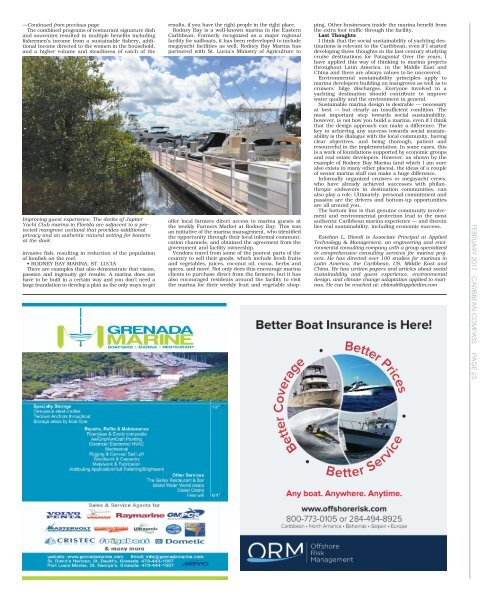Caribbean Compass Yachting Magazine February 2017
Welcome to Caribbean Compass, the most widely-read boating publication in the Caribbean! THE MOST NEWS YOU CAN USE - feature articles on cruising destinations, regattas, environment, events...
Welcome to Caribbean Compass, the most widely-read boating publication in the Caribbean! THE MOST NEWS YOU CAN USE - feature articles on cruising destinations, regattas, environment, events...
You also want an ePaper? Increase the reach of your titles
YUMPU automatically turns print PDFs into web optimized ePapers that Google loves.
— Continued from previous page<br />
The combined programs of restaurant signature dish<br />
and souvenirs resulted in multiple benefits including<br />
fishermen’s income from a sustainable fishery, additional<br />
income directed to the women in the household,<br />
and a higher volume and steadiness of catch of the<br />
Improving guest experience. The docks of Jupiter<br />
Yacht Club marina in Florida are adjacent to a protected<br />
mangrove wetland that provides additional<br />
privacy and an authentic natural setting for boaters<br />
at the dock<br />
invasive fish, resulting in reduction of the population<br />
of lionfish on the reef.<br />
• RODNEY BAY MARINA, ST. LUCIA<br />
There are examples that also demonstrate that vision,<br />
passion and ingenuity get results. A marina does not<br />
have to be built in a certain way and you don’t need a<br />
large foundation to develop a plan as the only ways to get<br />
results, if you have the right people in the right place.<br />
Rodney Bay is a well-known marina in the Eastern<br />
<strong>Caribbean</strong>. Formerly recognized as a major regional<br />
facility for sailboats, it has been redeveloped to include<br />
megayacht facilities as well. Rodney Bay Marina has<br />
partnered with St. Lucia’s Ministry of Agriculture to<br />
offer local farmers direct access to marina guests at<br />
the weekly Farmers Market at Rodney Bay. This was<br />
an initiative of the marina management, who identified<br />
the opportunity through their local informal communication<br />
channels, and obtained the agreement from the<br />
government and facility ownership.<br />
Vendors travel from some of the poorest parts of the<br />
country to sell their goods, which include fresh fruits<br />
and vegetables, juices, coconut oil, cocoa, herbs and<br />
spices, and more. Not only does this encourage marina<br />
clients to purchase direct from the farmers, but it has<br />
also encouraged residents around the facility to visit<br />
the marina for their weekly fruit and vegetable shopping.<br />
Other businesses inside the marina benefit from<br />
the extra foot traffic through the facility.<br />
Last Thoughts<br />
I think that the social sustainability of yachting destinations<br />
is relevant to the <strong>Caribbean</strong>, even if I started<br />
developing these thoughts in the last century studying<br />
cruise destinations for Patagonia! Over the years, I<br />
have applied this way of thinking to marina projects<br />
throughout Latin America, in the Middle East and<br />
China and there are always values to be uncovered.<br />
Environmental sustainability principles apply to<br />
marina developers building on mangroves as well as to<br />
cruisers’ bilge discharges. Everyone involved in a<br />
yachting destination should contribute to improve<br />
water quality and the environment in general.<br />
Sustainable marina design is desirable — necessary<br />
at best — but clearly an insufficient condition. The<br />
most important step towards social sustainability,<br />
however, is not how you build a marina, even if I think<br />
that the design approach can make a difference. The<br />
key to achieving any success towards social sustainability<br />
is the dialogue with the local community, having<br />
clear objectives, and being thorough, patient and<br />
resourceful in the implementation. In some cases, this<br />
is a work of foundations supported by economic groups<br />
and real estate developers. However, as shown by the<br />
example of Rodney Bay Marina (and which I am sure<br />
also exists in many other places), the ideas of a couple<br />
of senior marina staff can make a huge difference.<br />
Informally organized cruisers or megayacht crews,<br />
who have already achieved successes with philanthropic<br />
endeavors in destination communities, can<br />
also play a role. Ultimately, personal commitment and<br />
passion are the drivers and bottom-up opportunities<br />
are all around you.<br />
The bottom line is that genuine community involvement<br />
and environmental protection lead to the most<br />
authentic <strong>Caribbean</strong> marina experience — and therein<br />
lies real sustainability, including economic success.<br />
Esteban L. Biondi is Associate Principal at Applied<br />
Technology & Management, an engineering and environmental<br />
consulting company with a group specialized<br />
in comprehensive consulting services for marina projects.<br />
He has directed over 100 studies for marinas in<br />
Latin America, the <strong>Caribbean</strong>, US, Middle East and<br />
China. He has written papers and articles about social<br />
sustainability and guest experience, environmental<br />
design, and climate change adaptation applied to marinas.<br />
He can be reached at: ebiondi@appliedtm.com<br />
FEBRUARY <strong>2017</strong> CARIBBEAN COMPASS PAGE 23


















